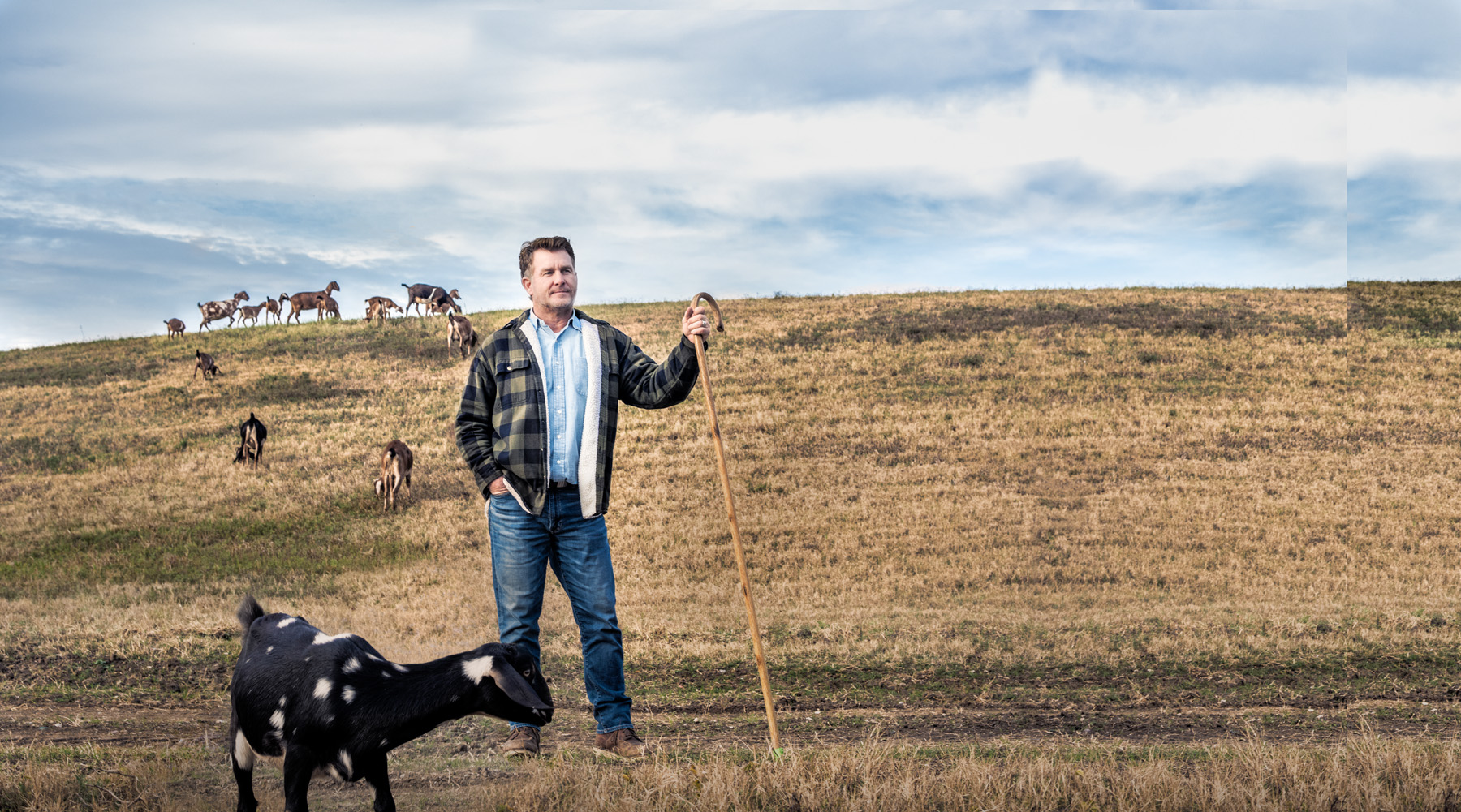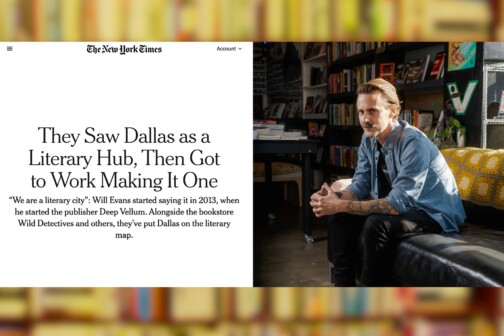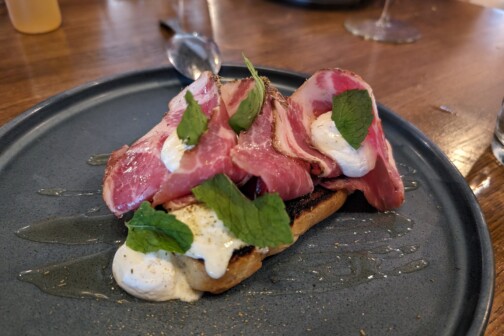During the pandemic, I have routinely stopped by Bonton Farms in South Dallas to pick up my weekly groceries. And during those visits, I often run into the farm’s founder, Daron Babcock; his wife Theda, who runs the financial side of things; and Danny George, the farm’s manager. But I was long overdue for a chat about the many recent developments: the new chef overseeing the cafe and coffee shop, the impact of the coronavirus and the Black Lives Matter movement on the neighborhood, and possible plans for a second location in Lake Highlands. So last Tuesday, I sat down with Theda and Daron in their office in the back of the coffee shop to catch up, before I picked up some Bonton honey butter and beets to take home. The following has been edited for clarity and length.
Daron: The world’s blowing up around us, if you hadn’t noticed.
Kathy: Yeah, it’s hard to miss. How are things in Bonton?
Daron: I don’t even know how to put words to it. I said something yesterday — I was like, you know, I don’t understand it cause I’m not it, right, but we’re bathing in it. It’s all over us because we’re immersed in it. But it’s not — I still can’t comprehend. Like when one of our board members that’s a psych trauma counselor, she’s a licensed doctor and trauma counselor, and she just said, “You know, this is what needs to happen to change our country. And so I’m honored to be a part of it, but I just can’t show up. I can’t separate what I’m going through personally with what I need to do professionally. So I just gotta check out.” And I just don’t know that I can understand.
Theda: It’s how to be a professional black person, you know, where you come to work the next day and it’s like, “Can you give me that presentation?” It’s hard to be professional, because she’s feeling her own emotions. And that’s why she’s like, “I just can’t do the board meeting.”
Daron: We have several Black board members. One is an attorney, and he was just like, “You know, I didn’t want to be here, but I know this is the only constructive thing I can do; this is making a difference. So I’m going to show up, but I just want you to know that I’m not really feeling it right now.”
Kathy: What’s been the reaction of the community?
Daron: Ricky on our staff was broken down and saying, “I got to try to explain to my kids — my son is in track, and right now I’m telling him, he’s got to run in the backyard. I won’t let him run in the street. That’s so hard to do. We’re supposed to be living in a country where we’re free, and I don’t feel comfortable with him running down the street.”
We had a prayer time this morning under the shed where we kind of had a moment of silence. Trog [Trogdon] handed out notebooks to everybody, and they got to try to get it — we were just saying that it’s OK to be angry and emotional, but it’s not OK to let it become destructive. So how can we process that together, to where we get to experience it? Where we’re not robbing each other of the right to feel or to be angry, but to do it in a way that we’re not compounding it? So write it down, get it out, throw it in this bucket.
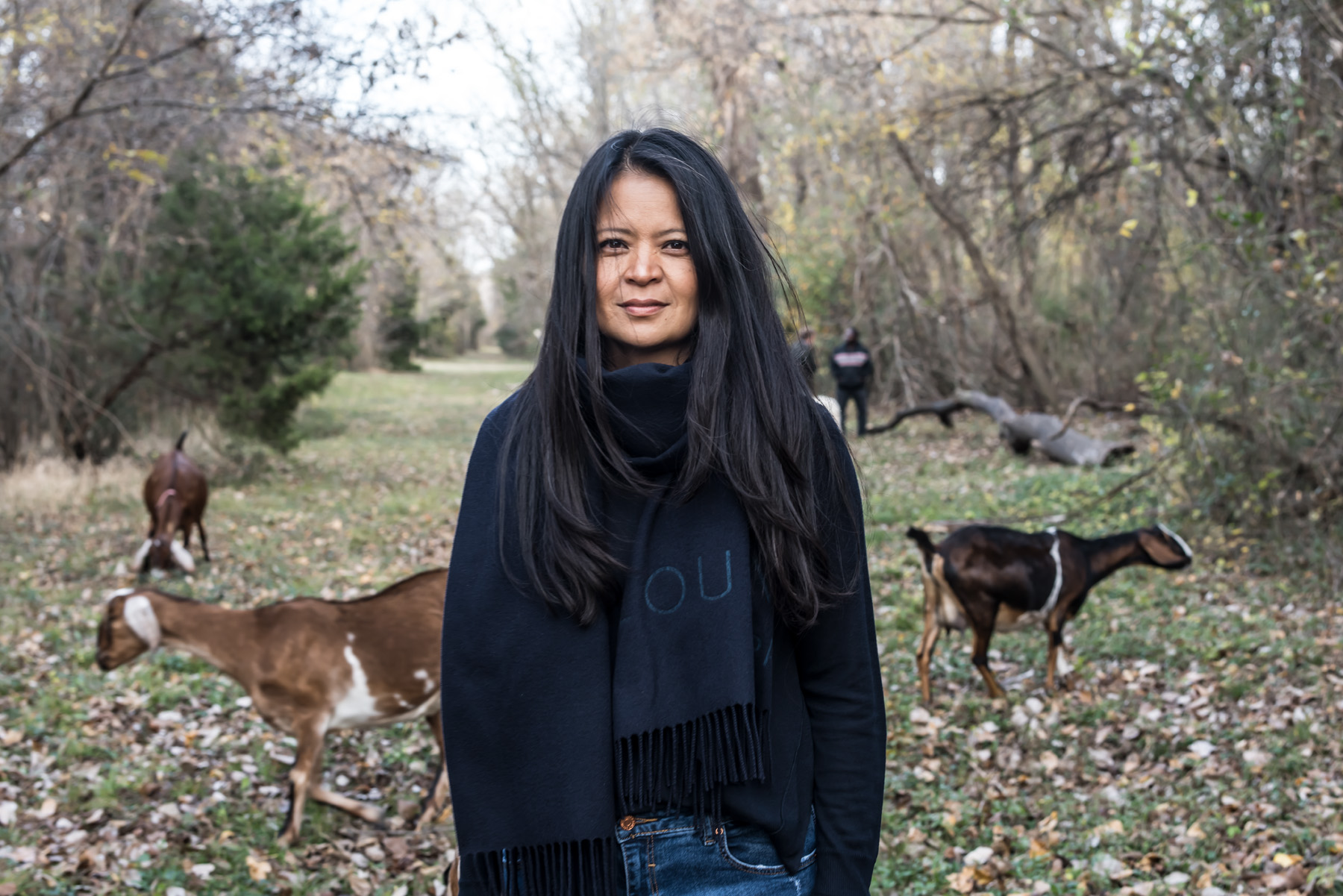
Theda: And I think that’s the message: it’s OK to be angry. It is. But it’s not OK to sin because of that anger. Last night, I left here at like 9 o’clock. And driving home — I didn’t know if people are practicing the curfew thing, but everything was quiet. I mean quiet. I didn’t see even a single person between here and our house. So in a way, I actually feel safe right here.
Daron: You’d think it’s the safest place to be, which is crazy.
Kathy: Well, of course, the communication is theoretically being externalized, right? Like this neighborhood knows exactly what is happening. They don’t need the education.
And then, of course, there’s the coronavirus.
Daron: Here, with the kids out of school, it’s like summer vacation. They don’t know. They have no idea. We talk about it, so they know, but they don’t understand. The Governor died last week from COVID. She’s known as the governor of our neighborhood. For 50 years, she’d sit on her porch and preach to people walking by. The first time I met her, I was volunteering down here. I was walking down the street and she started yelling at me. I’m new here, and I’m like, oh crap. I don’t know what to do.
So I walked up to the fence and said, “Excuse me, ma’am, are you talking to me?” And she said, “Yes. Don’t you be walking down the street in those shorts, tempting the ladies.” I was like, wow, nobody has ever said that before. But she was just an icon here. Everybody loved her. Everybody took care of her.
The city foreclosed on her house, and they were gonna put her out. Miraculously, it just fell off the list. And then the next year it came back on, and I went to the city and tried to get them to make it go away again. We tried to raise the money to buy it and didn’t. It was a closed bid, and we just didn’t raise enough. Somebody else got it. And then we had to go find that person and get it back from them so she could stay there. And then a year and a half later she had a stroke. She’d been living in a home to get the care she needed, then she got COVID in the home and died last Saturday
People have been able to get testing here now. But in the beginning, when we had people come by that weren’t feeling well, they would go for testing and, if they had symptoms, they would just say go home for 12 or 14 days and take Tylenol and NyQuil. So that’s what I kept saying in the beginning is how the heck do we know if you’re not going to test anybody?
Kathy: I know right before this all started, you had just expanded and opened the coffee shop. Then the bottom fell out. How has all that been going?
Theda: We’re lucky because we’re getting catering orders for feeding first responders and hospitals, and then, you know, the food ordering. We’re getting our kitchen running and making the biscuits. And then the farmers market. We didn’t realize how many orders we would get, you know? We’re thinking about putting a system in place so we can continue that even when things are back to where they were. We never really liked the whole CSA concept, but we’re thinking about a monthly food box. And we have a consultant working with us from Blue Hill at Stone Barns in New York that’s helping us with just improving our process in the farmers market and the coffee house. And now that the cafe is open, people are coming in and out and starting to pick up food. So it’s good.
Kathy: What part of your funding comes from donations, or came from donations before?
Daron: About 75 percent. We have about 25 percent that comes from earned revenue. So that took a hit, but Theda was astute enough to say the restaurant’s closing, so we’ll put lists at the farmer’s market, and it blew up. So it’s kind of equaled out. And then we started getting grants to do the feeding program. It’s not normal operations, and it won’t continue, but it’s business during this time.
Then we have about a quarter of our revenue that comes from a little thing called Friends of the Farm, from all the people that come out here. If you believe in what we do, just make a $10 a month donation, or a $20 a month donation. So a quarter of our revenue comes from 200 people or so. If you take out a couple of people that give a lot monthly, it’s normally about $23 a month as an average. The last 50 percent are the family foundations and grants and things like that.
Kathy: And now you’ve got the $75,000 grant from Mark Cuban?
Daron: Yes. Our monthly budget’s around $200,000, $210,000. We’re in a really good position right now. You know, CNN did this article that said when the pandemic hit, they estimated that 70 percent of all nonprofits wouldn’t be here by the end of it because the average nonprofit has about 90 days’ operating capital. And we’re not in that boat. So we’re healthier than most, but this is just a really volatile, dangerous time.
And we’re talking to the consultants, the people that advise us about what do do, about the emergency funding right now. We’re comfortable at the moment because we’ve been the beneficiary of emergency funding. But a lot of that emergency funding comes from what we would have been getting normally. For nonprofits, 30 percent or more of your whole budget comes from year end giving before people pay their taxes. This is just emergency funding. So we’ve got to be smart and say, we are probably not going to get the same money at the end of the year. They just expedited it. The economist that I talked to said, you better tighten down for two years. It’s just wealth has shrunk, and it’s going to take a while to build back up.
Kathy: And you’ve got a new chef now, Jessica Stampley?
Theda: We put out this ad and, you know, she’s young; she’s hungry. I didn’t even know when I interviewed her that she was on Chopped. She’s never been an executive chef. It was supposed to be a pastry chef position. And then after we talked to her, we said, you know, why can’t she just lead? She has the passion for farm to table, using local, seasonal ingredients.
So it was a challenge for her, because she’s young, and now she’s leading a team that’s a lot older than her, and then breaking their habits. But she wants to grow. She wants the challenge. So she’s been really amazing and just easy to work with.
Kathy: Her quiches are amazing.
Theda: Did you see the pictures from Saturday night? There was a lady here, she’s an executive at Neiman’s. She was shopping here after a tour, and it was her husband’s 40th birthday coming up. And she emailed me and said, “Oh, I’d love to do a dinner there. Do you guys do that?” And she’s like, “We can even eat on paper plates.” I was like, “Oh, no, we do have real plates!” The grazing board that Jessica made with all the vegetables that we grow, and the pickles and goat cheese and the honey, it was really nice. And the goat’s milk ice cream that she made.
Daron: Since we’ve been here, we’ve said that to do this well, and in order to survive even, we have to do three things really well. We have to let the personality of our people come out. This is a unique place, and people want to experience the uniqueness of it. We have to have a really beautiful place that we maintain and keep it beautiful. And then we have to tend to the farm and do real farm to table food, and it needs to be seasonal and change with what’s available. And it’s been impossible to find chefs that really understand or appreciate that.
Theda: Jessica came from Gemma, she worked there. And then after that, Melt ice cream in Fort Worth.
Daron: What we want to do is bring skilled people like that here, so that the people we train learn the highest standard. If we help people prepare for a job here, we want them to be able to take that experience and plug into the best places in Dallas. And the way we can do that is to treat this like it’s a world class place. We haven’t been able to do that yet, But I really believe with the team we have that we can. Now, the people that we hire from the neighborhood will have the experience to do things the right way. So they can be confident. They can go anywhere and fit in and be able to do whatever’s expected of them. And we just hadn’t had that until Jessica came.
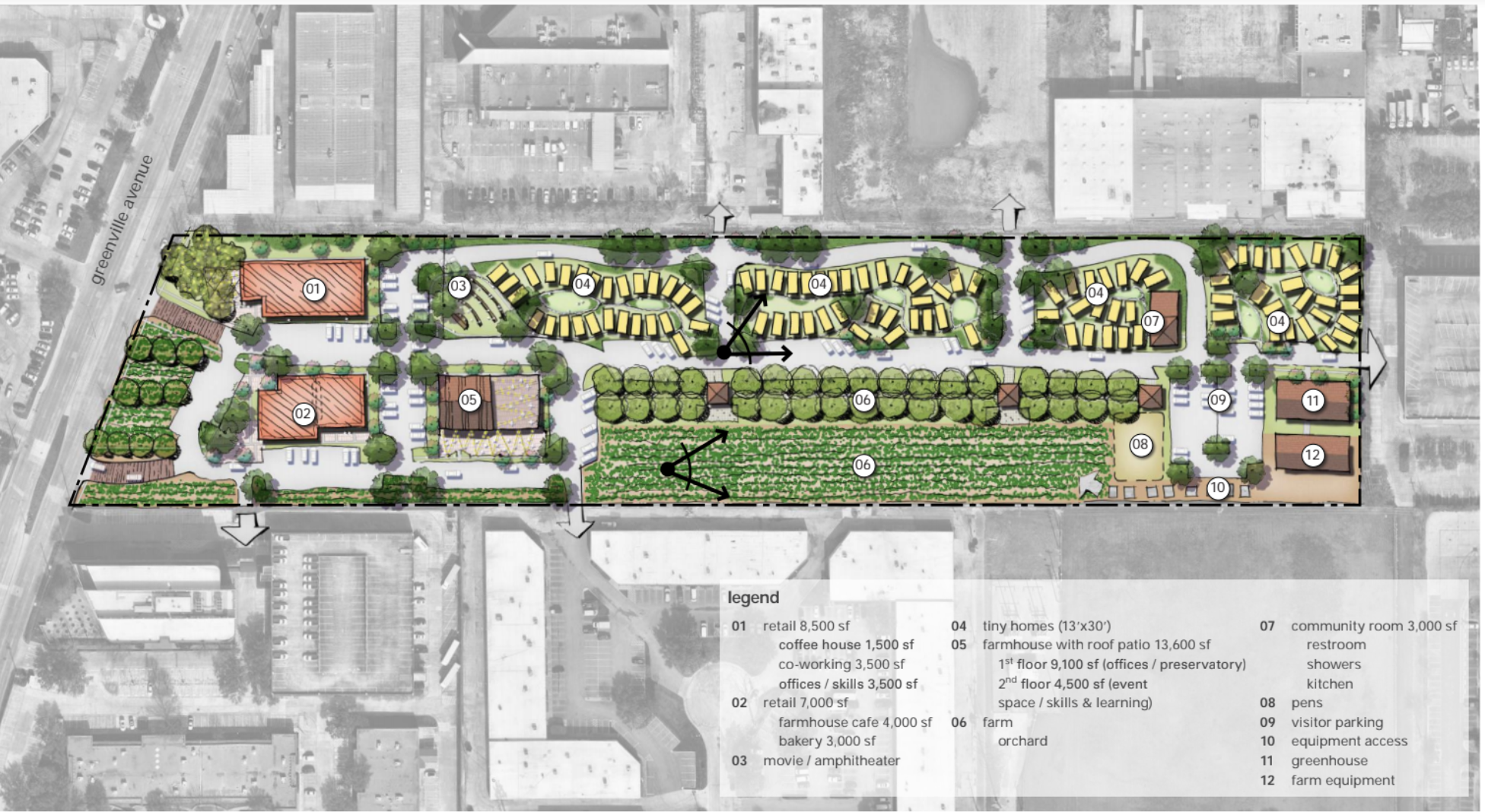
Kathy: What are your biggest needs at this point?
Daron: So, about eight months ago, I don’t know if you remember hearing about the site at 12000 Greenville Avenue. The city has a problem with homelessness, and so they formed this Office of Homeless Solutions and they gave it a $20 million budget. And then they tried to just shove permanent supportive housing, a dog shelter, and a water tower on this piece of land in Lake Highlands. It was going to be $200,000 per door for that permanent supportive housing for the homeless. It was a multifamily facility, but it cost $200,000 for every unit. That’s just it — if we do things that irresponsibly, we’re never going to catch up to the problem because we’re just blowing that money, which can go three times that far or more.
And so it got squashed in kind of a public battle between Adam McGough and the city manager. The city manager accused him of this nimbyism, and McGough said that’s not it at all. I want to be a part of that answer, but I don’t want to do it the wrong way. And the city manager’s like, so what’s the right way. And he said, I’d do it if it was Bonton Farms. That’s what I think the right way is.
We met with the economic development team yesterday, which is seven or so of the city council members, Mayor Eric Johnson, and the new head of economic development. And they all said, absolutely yes. The only thing that we have negative to say is we want one in our district. We’re jealous. We didn’t do it first.
Kathy: How big is the property?
Daron: Twelve acres. And it’ll have 120 tiny homes on it and a four-acre farm. And other than that, the front part of it will look a lot like this with public facing businesses. It’s likely to be born in 2021.
And not that we have the answer to anything — I’m the first to say I have no idea what happened here, but it’s beautiful. And I want to do more of it because it’s working. What’s happening here needs to happen more and more places around the city. It looks like that door’s opening.


